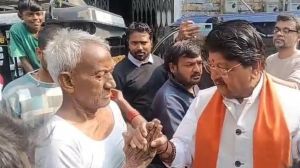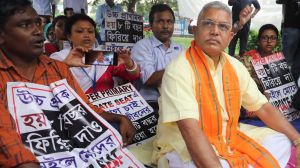Works and days
Osho World devoted last week to a celebration of Guru Nanak Devji. It was inaugurated by Dr Manmohan Singh, our former Union Finance Minis...

Osho World devoted last week to a celebration of Guru Nanak Devji. It was inaugurated by Dr Manmohan Singh, our former Union Finance Minister, followed by Shabad Kirtan sung by Dr Ajit Singh Paintal, a well-known musician and teacher in the capital. The week concluded this Saturday on Nanak Jayanti, also called Guru Purab. What struck me most about Osho8217;s take on Guru Nanak Dev was his perception of the Sikh guru as the embodiment of joy, song and flowers. It was satisfyingly in tune with my Jesuit friend Father Gispert8217;s belief in Ananda, Divine Joy, with the Sufic ecstasies of Omar Khayyam, with Buddhist quot;Muditaquot;, with the strong universal drive to seek and share happiness. But divine lives have come and gone, faiths have been founded, edifices and theologies constructed, schisms have rent the seamless fabric of belief into shreds. All faiths seem to practise social discrimination. This, then, is a plea to all well-intentioned people to stop thinking in stereotypical slabs, in divisions of black and white.An individual approach is surely more sensible and practical and will serve the cause of mutual acceptance better, as Guru Nanak Dev and all spiritual masters wished.
For a start, may we stop blaming each other so sweepingly? Must all Indian Muslims be continually accused by Hindus? Must all caste Hindus be continuously vilified? Social engineering is a long process in a poor and mostly illiterate country like ours. But many people in urban India are already pushing the change wedge. Since many years now, this urban professional class has intermarried right and left. It8217;s raising a splendidly khichdi generation to populate tomorrow8217;s India 8212; if they8217;re not driven away, that is. It is amongst these people that you8217;ll find enthusiasts who work to preserve marginal and dying crafts, songs, stories and artefacts of cultural identities. It is they who go to IRMA and work in cooperatives, found NGOs, struggle to empower beedi workers and saathins a concept created by Women8217;s Development programmes, evaluate the pros and cons of participatory intervention with passionate sincerity. They too struggle for honourable livelihood in a poor country wrecked by misuse of politicalprivilege by the enterprising few 8212; of all social and religious types.
Unrelenting accusation and guilt-tripping will not win friends or influence people. Investments in quality will. Let us learn from India8217;s working women, whatever their caste or religion. There are no shortcuts for them. They cannot cross the street without some man trying to jostle them except in Mumbai. But in two generations, they have created so much space for themselves, even while paying harsh personal prices. It8217;s been said to many such women, quot;You were born into a privileged society. YOU don8217;t win the Person of the Year Award for Suffering.quot; But till social transformers came along, no Hindu woman, unless she was a courtesan, had the right to be educated!
Sometimes, all it takes is ten years to effect profound change. The Lunkaransar Bunkar Samiti, near Bikaner, is a cooperative of Dalit wool weavers. Empowered by an NGO, they now run their own show. Sanjoy Ghose8217;s mother says that they set up their own school for their own children, but it is so good that the local Rajputs now send their children there. At that juncture, a shortsighted person might have said, quot;Don8217;t let them in! Historical revenge!quot; But wiser long-term thinking made the quiet point that it was this kind of bonding that would effect deeper social transformation. Such answers have been devised beautifully before, as Guru Purab reminds us. Guru Nanak Devji8217;s Teeser Panth or Third Way tries to reconcile divisions in faith and society and holds important answers to our most anguished questions, if we listen.
- 01
- 02
- 03
- 04
- 05































